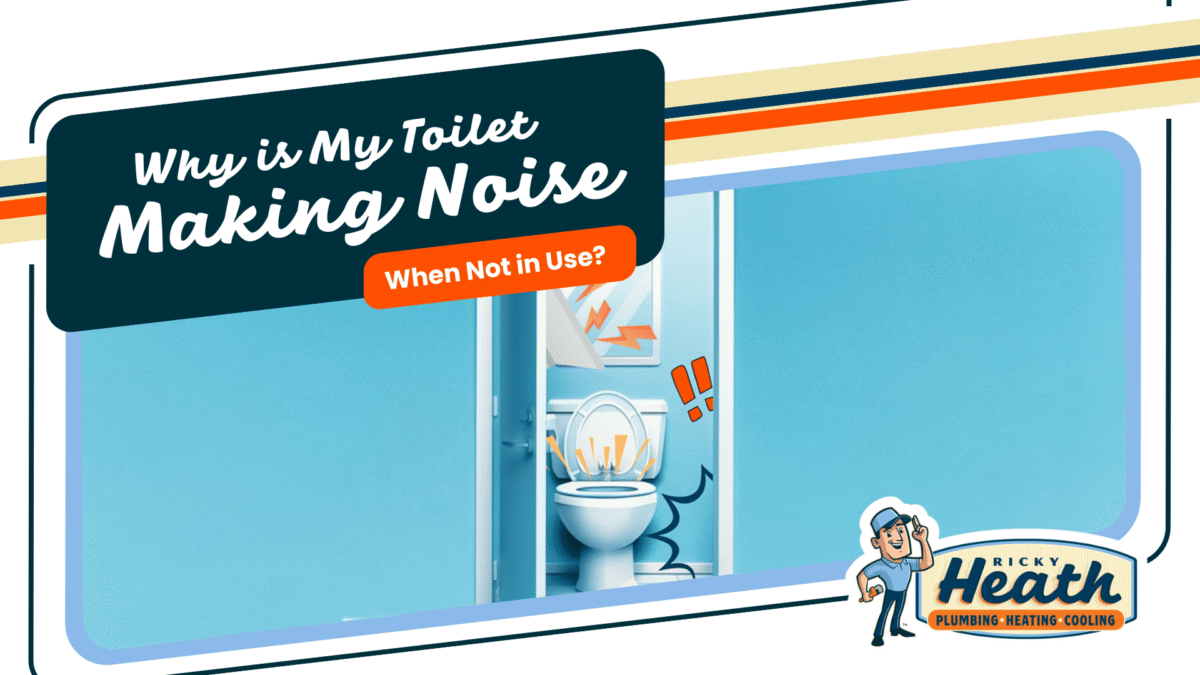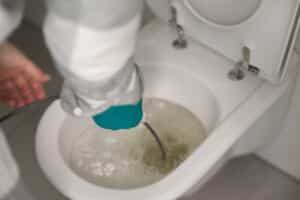
When your toilet is making noise, it’s more than just annoying — it can drive up your water bill, cause a mess, or indicate serious plumbing issues. Explore some common reasons why your toilet is making noise when not in use, learn some toilet sound troubleshooting tips, and recognize signs that it’s time to call a pro.
If the toilet in your Macon home is making noise and you’re unsure what to do, contact Ricky Heath for reliable, professional plumbing solutions.
Common Reasons for Toilet Noise
From leaky valves to high water pressure, many different issues can cause your toilet to make a strange noise.
Ghost flushing
One of the most common toilet noises is “ghost flushing,” which occurs when the toilet flushes by itself. While this can be unsettling, the cause is usually simple — when water leaks from the toilet tank into the bowl, it slowly empties the water volume in the tank. When the level gets low enough, it triggers the automatic flush response.
High water pressure
A loud banging noise a few minutes after flushing the toilet can indicate high water pressure in your bathroom. After you flush, your toilet tank refills for a few minutes, and then the water valves close. If your water pressure is too high, these valves close abruptly, creating a loud banging noise.
Broken flapper

A broken flapper can cause a slow, prolonged hissing sound after you flush the toilet. A brief toilet hissing noise is usually nothing to worry about. However, if you hear this noise constantly, the flapper may be causing a steady leak. In addition to creating an annoying sound, a broken flapper wastes water and may increase your water bill.
If you’re looking for ways to save on your water bill, consider a water-efficient toilet for your next bathroom remodeling project.
Fill valve problem
An issue with the fill valve or ballcock can create an ongoing sound similar to TV static. This noise comes from water moving through the toilet and continuously draining into the overflow pipe. In some cases, constant water flow and leaks can cause your toilet to sweat, leading to additional moisture issues.
Drainage issues
A gurgling noise coming from your toilet usually indicates a drainage problem. If the issue is restricted to your home, it’s most likely a clog somewhere in your plumbing. If everyone in the neighborhood is having the same problem, contact the city to inspect the municipal sewer line.
Impact of Water Pressure on Toilet Noise
Water pressure issues are one of the more serious causes of toilet noise. Both low water pressure and high water pressure cause a variety of toilet sounds that need a professional fix.
Low water pressure
Low water pressure can prevent your toilet from flushing and refilling properly. A toilet with low poor water pressure may need multiple flushes or make a gurgling sound due to trapped air. Gurgling may also indicate toilet clogs, so diagnosing this issue may require professional troubleshooting.
High water pressure
High water pressure may cause loud banging sounds when valves close too sharply. This is called “water hammering” and will usually happen after you’ve flushed the toilet, turned off the tap, or shut off another water source.
High water pressure can also cause a humming or whining noise. This happens when water moving forcefully through your plumbing causes the pipes to vibrate. High water pressure may cause a pipe to burst, resulting in a messy and expensive cleanup.
DIY Solutions for Noisy Toilets
DIY troubleshooting a noisy toilet is a good place to start. Try these tricks to diagnose and resolve the issue. However, contact a pro if you’re not sure how to proceed or if there’s a risk of damaging the plumbing system.
Unclogging
If your toilet is making a gurgling noise, the first step is to try unclogging it with a plunger. If this doesn’t work, a toilet snake helps address clogs that are lodged deeper in the drain line.

Not all clogs can be solved with a DIY solution. If the clog has moved beyond the reach of your toilet snake, it’s time to call a professional plumber. In some cases, this may be a municipal issue if the problem is with a shared city sewer line.
Replacing the flapper
The toilet flapper is a small rubber seal inside the toilet tank. When you flush the toilet, the seal lifts, allowing water from the tank to flow through the flush valve and empty the toilet. This toilet part sees a lot of wear and tear, so it typically lasts about five years. Broken flappers are a common cause of water leaking from the tank.
The first step is to adjust the flapper. Open the tank and move the flapper around, making sure it’s in the correct position to close the valve. If this doesn’t work, you may need a new flapper. Contact a Ricky Heath plumber if you don’t feel comfortable installing it yourself.
Adjusting the water level
The float valve senses the water level in your tank and allows the flush system to proceed. Issues with float valve adjustment can cause your float valve to trigger frequent flushing or leaks from the tank.
When you open up your toilet tank, you’ll usually find a plastic ballcock floating on top of the water. This attaches to the float valve, allowing it to detect water levels. Adjust the screw at the top of the float valve to raise or lower it as needed to correct the flushing issue.
When To Call a Professional
A noisy toilet can indicate a serious plumbing issue, like a problem with the water pressure. If you suspect a significant issue, contact a plumber for professional toilet replacement or repair. Ricky Heath’s membership plan offers plenty of solutions to fit your needs and budget.